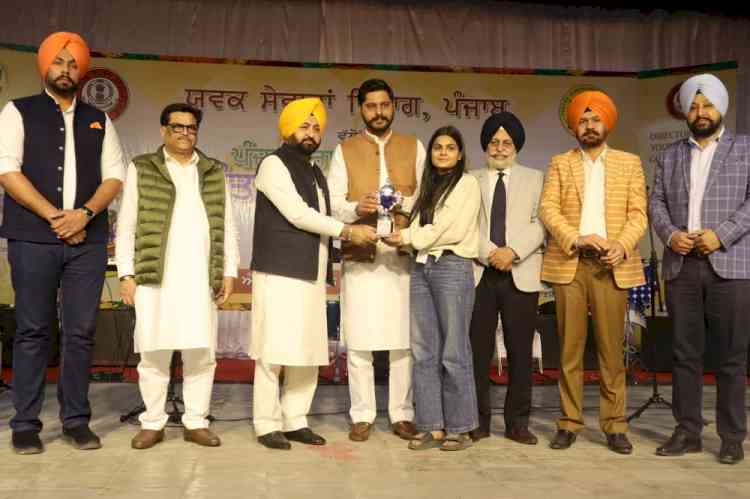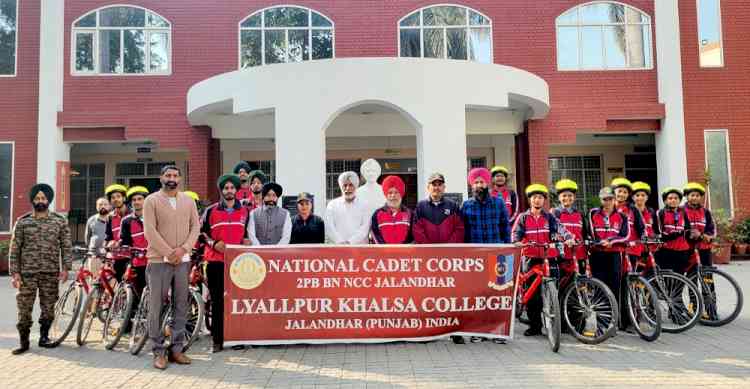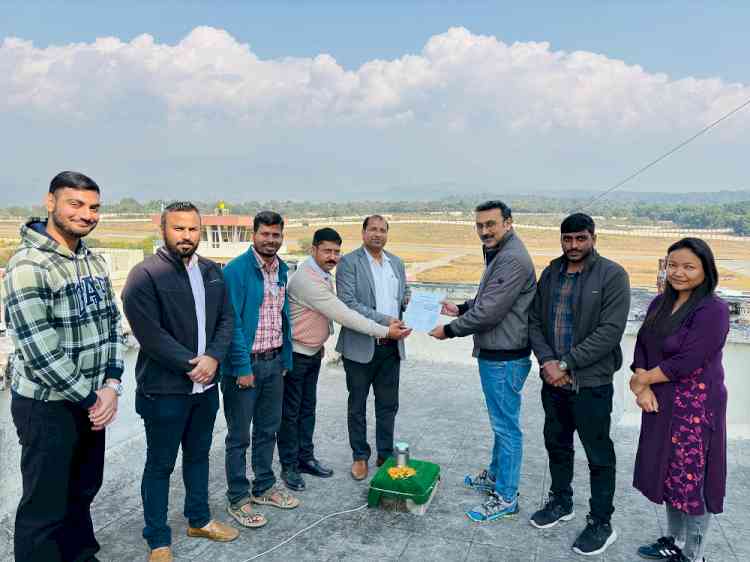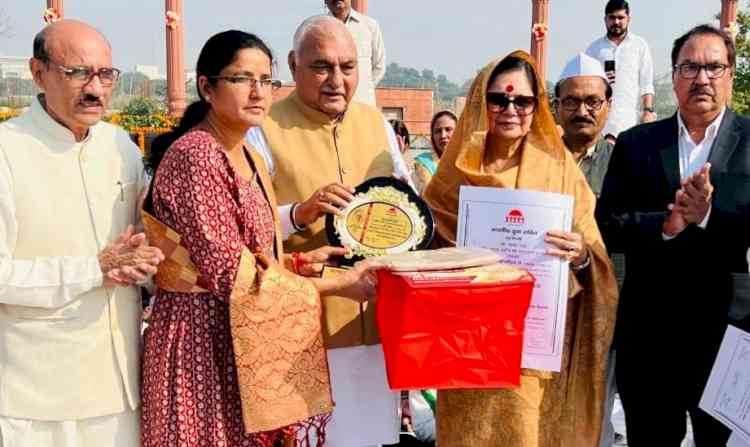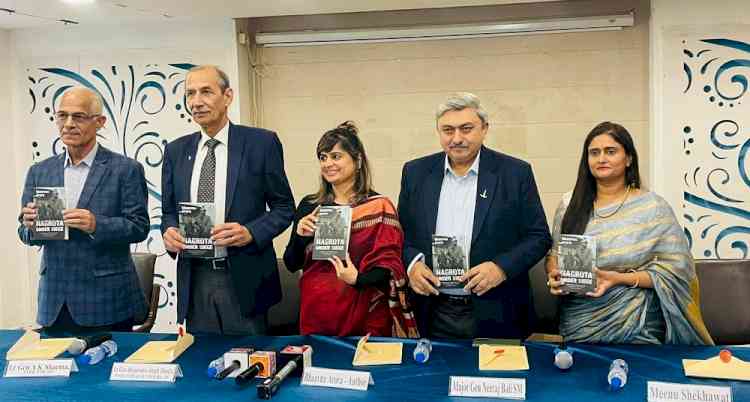2nd Day of Academic Engagement Programme with Western Sydney University
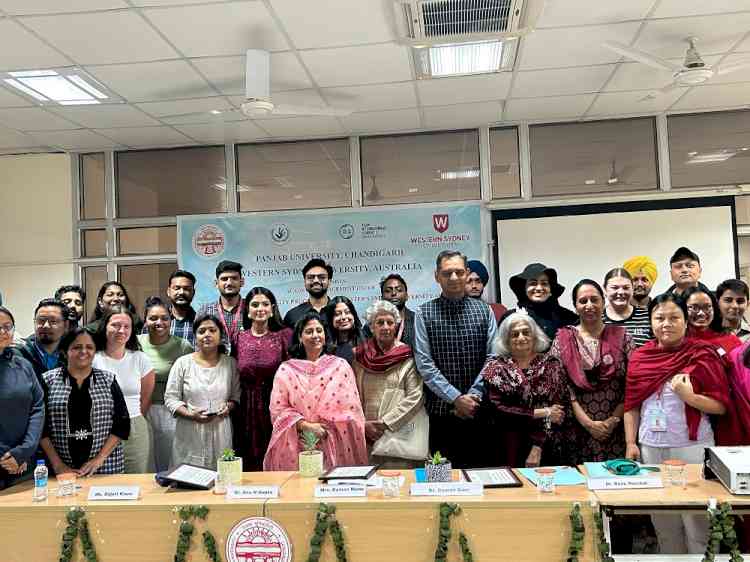
Chandigarh November 19, 2023: The Centre for Human Rights and Duties and Office of the Dean International Students, Panjab University in collaboration with Western Sydney University Australia is organising an academic engagement on the theme “Closing the Gap: Enhancing Women’s Wellbeing in India” from November 15 to 25.
The Australian students from Western Sydney University have been selected under the New Colombo Plan to participate in the programme in India. They will be at the Centre for Human Rights and Duties, Panjab University, Chandigarh the academic partner of this programme wherein they will engage in academic sessions, workshops and field trips on diversity related issues along with the students from the host University. The Centre for Human Rights and Duties organised 6 academic sessions lasting over two days planned to acquaint the students with various facets of the opportunities and challenges of women’s well-being in India. The Program Coordinator, Dr. Upneet Kaur Mangat, Chairperson, Centre for Human Rights and Duties informed that the academic sessions have been curated on theme “Women’s Well-being in India” wherein pioneers both from academia, health sector, industry and NGOs in field of gender had contributed as resource persons and session chairs. The objective was to give an overview of emerging opportunities and challenges in women’s well-being in India to the Australian students with a focus on both conceptual understanding and exposure to lived realities of women.
The theme of the academic session on the 2nd day of academic engagement was ‘Women’s Movements and Legal Rights in India.’Prof. Anil Monga, Chairperson, Centre for Police Administration who was chairing the session commenced the panel discussion by introducing the panellists’ experts on the issue. Prof. Navneet Arora from UILS, spoke on women’s movements in India. She said that there are certain tags women belongs to. They are considered ‘weaker section’, ‘oppressed’, ‘discriminated’, ‘faces a lot of violence’ etc. By tagging women is an excuse to devoid of public sphere such as politics, career opportunities. But the history speaks women standing against government, sexual violence, politics, and environment in India. They have stoop up against dowry system, sati system, child marriage, purdah system, female infanticide, and other issues in India. There are exceptional women like Rassundari Devi, Sawarna Kumari Devi, Tarabai Shinde, Pandita Rama Bai, Savitri Bai Phule who are pioneer of major movement in India led by these women. There are women like Urvashi Butalia and Ritu Menon, who are first publishers on women. Kamla Bhasin in 1970s started women movements and founder of Jagore. She introduced with participation of women in recent major protests in India such as Shaheen Bagh Protest led by Muslim women, farmer’s protest led by Punjab region women, protest against armed forces special power act led by Manipur region women. She highlighted certain movements such as PinjraTod movement, Me too movement, Stop Acid Sale Movement, Anti-Liquor movement and Exemption of tax on Sanitary pads, where women participation cannot be ignored. Prof. Namita Gupta from Centre for Human Rights and Duties focused on how environment or climate crisis affects the women differently. She discussed major environmental movements led by women in India. She gave example of ‘love canal tragedy’ in US, where a woman was first discovered the environmental crisis in one locality where she was living which was affecting her child along with other children of the locality. She tried to explain how a woman is connected to nature. She expressed that how natural disaster, exposure to pesticide and chemicals in industry affects women differently. There are movements such as Chipko Movement in Uttarakhand, based on livelihood more than environment led by women. There is another movement Pluck and Plant Satyagraha in Karnataka where movement replanted local trees in their locality plucked by the authorities. She ended with the note that we think climate crises are gender neutral but these are not gender neutral. Prof. Supinder Kaur from Department of Laws spoke on three major things: Laws that are protecting property rights of women; legislations that provide social security to women; and legislations prohibiting and preventing atrocities committed against women.
The next Academic session was on the theme ‘Community Engagement and Women’s Empowerment Initiatives’. Dr. Gaurav Gaur, Chairperson, Centre for Social Work was chairing the session. He commenced the panel discussion by introducing the experts on the issue. Dr. Bhavani Rao, Dean , School of Social and Behavioural Sciences, UNESCO Chair in Women’s Empowerment and Gender Equality , Amrita University, Amritapuri, Kerala joined the panel discussion through online mode. She has spoke about the women empowerment and vulnerability. Empowerment is increasing women choices and capacity to make discerning decisions towards sustainability and resilience. Vulnerability is the flip side of empowerment. One cannot have empowerment without vulnerability. There are domains that influence the women empowerment such as mental space, awareness, opportunities, and access domain. Empowerment context is critical. In case of women empowerment there is need to empower individual along with their family and community. Resistance, Resilience, Intervention, and Impact/Feedback are the elements for empowerment. Advancing Women’s Empowerment through System Oriented Model Expansion (AWESOME), is the model they follow to empower women. They are also working on addressing India’s complex problems on skill development. She also highlighted how her Centre has been integrating technology, robotics and artificial intelligence for empowering rural women.
Raman Mann, theco-founder Chandigarh Organic Farmers Market shared her journey of setting up the organic farmer’s market which was set up initially to help the farmers since marketing is the big problem in farming. She started with 13 farmers. She also mentioned that working with the local farmers, its two-way learning experience. The farmers are learning from her and she is also learning from the farmers.
Dr. Anu Gupta, Chairperson, University Institute of Fashion Technology spoke on the community engagement and women empowerment initiative through Phulkari. She shared her experience on working with women, who are learning embroidery and inculcating a skill in them. She shared that working with them has provided training to the artisans, boost the marketing of their product, increased the participation of women in craft fairs without the help of family, it empowers them. With the help of the skill the women have started their self-help groups which has provided them identity, decision making power, realization of their own potential and economic freedom.
Diljott Kaur, an actor and founder of Dream Buds Foundation, introduced the audience with her organization Dream Buds Foundation. The organization is working to support the budding dreams of the underprivileged people who do not have the platform and sources to fulfil their dreams. During covid times the organization helped the people by distributing grocery items. For poor rural women, they have organized three-month mental health campaign. The campaign has boosted the self-esteem of these women.
The post-lunch session was followed by visit to the NGO Chotti Si Asha, where the Co-founder Jatinder Mann shared how their NGO was empowering the rural migrant women in KhudaLahora .
The evening session culminated with cultural performance by student buddies from Centre from Human Rights and Duties, UICET and Australian students. They were acquainted with Indian culture of rangoli, mehendi, churiyan, folk performances of giddha and bhangra and saree tying. The next few days the students will be visiting an NGO in Bassi Pathana alongwith student buddies from Panjab university and their faculty.


 City Air News
City Air News 
